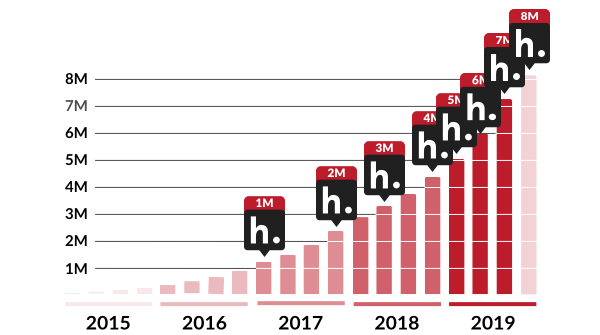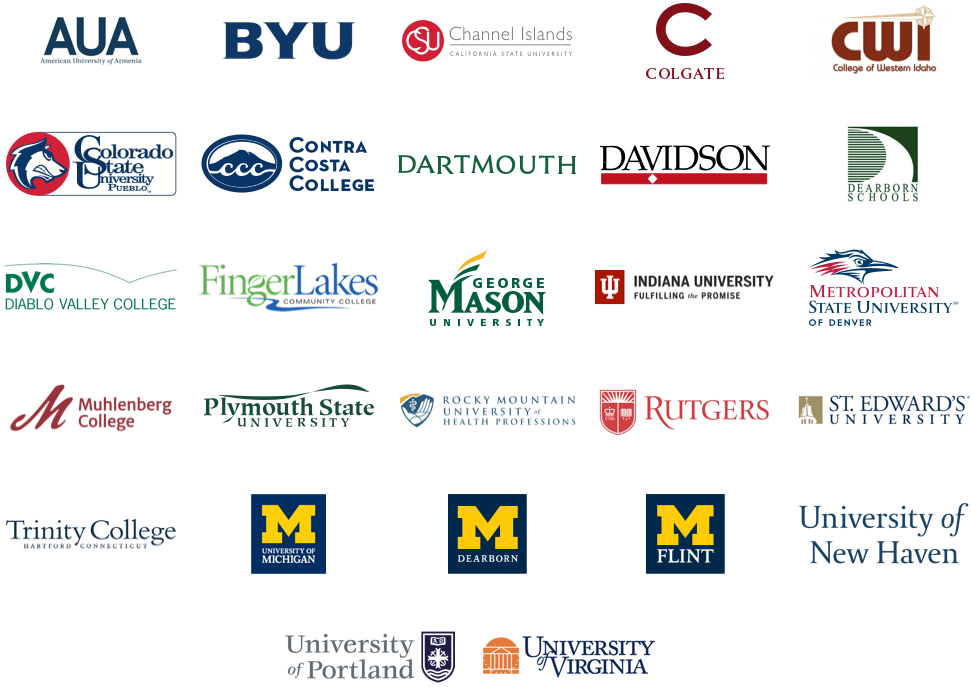8 Million Hypothesis Annotations
In 2019, we are seeing a dramatic acceleration in annotations created by people using Hypothesis. Our users have been making a million annotations every three months: We announced 5 million in March, 6 million in July, 7 million in September, and now — ahead of schedule — we are announcing 8 million annotations on over 800,000 different documents.
All these annotations are also being created by more people than ever. Over 300,000 people have created Hypothesis accounts — including over 100,000 just this year — and are actively annotating more than ever: we’ve seen over 10,000 active users every month this fall, with over 15,000 active users in both September and October.

Hypothesis in education
As we have seen before, students in colleges, universities, and high schools are largely behind this dramatic increase in annotation activity, especially since we released our LMS app that enables single sign-on, automatic private class groups, and now, gradebook integration, in every major learning platform, including Blackboard, Canvas, D2L Brightspace, Moodle, Sakai, and Schoology.
Start using Hypothesis in your LMS and learn more about pricing for your school.
Over 500 different schools have installed the Hypothesis LMS app. Within these schools, over 14,000 people have used Hypothesis and made more than 170,000 annotations in over 550 classes. Usage in Canvas leads the way with over 300 different classes using the Hypothesis LMS app, followed by Blackboard with over 100 and Moodle with over 50. We also see activity in D2L, Sakai, Schoology and some other platforms that support the IMS Learning Tools Interoperability (LTI) integration standard.
27 schools are now formally annotating Hypothesis, including American University of Armenia, Brigham Young University, California State University-Channel Islands, Colgate University, College of Western Idaho, Colorado State University-Pueblo, Contra Costa College, Dartmouth College, Davidson College, Dearborn Public Schools, Diablo Valley College, Finger Lakes Community College, George Mason University, Indiana University, Metropolitan State University Denver, Muhlenberg College, Plymouth State University, Rocky Mountain University of Health Professionals, Rutgers University, St. Edward’s University, Trinity College, University of Michigan, University of Michigan-Dearborn, University of Michigan-Flint, University of New Haven, University of Portland, and University of Virginia. Learn more about how to start a supported annotation pilot at your school.

Start a supported pilot with Hypothesis at your school.
As collaborative web annotation becomes more widely used, educators are starting to report benefits for student learning. Early research from Simon Fraser University suggests that most students find social annotation with Hypothesis helps them learn.
Extending and deepening research into the impact of annotation in teaching and learning is one of the goals of AnnotatED, the new community we started that includes participants from institutions using Hypothesis formally. The AnnotatED community also hosts events open to everyone interested in annotation in education, both virtual and face-to-face, in conjunction with other gatherings, like those we are planning for March, 2020 during EDUCAUSE Learning Initiative in Bellevue, WA, and for April, 2020 at OLC Innovate in Chicago, IL. Subscribe to get notified about new AnnotatED events.
Hear why educators are so inspired to annotate with students in this short video of highlights from educators presenting at I Annotate 2019, or explore videos from all the #ianno19 sessions about annotation in education, journalism, publishing, research, and technology, including Gardner Campbell’s inspiring keynote: The Simple Secret of the Note in Us All.
Patterns in annotation
A group of Hypothesis team members, led by Director of Integrations Jon Udell, Senior DevOps Engineer David Fine and Support Engineer Michael DiRoberts, have been working to enable our richer and more sophisticated understandings of annotation activity — not only for our internal use, but so we can also better report activity to our partners and users. We already have partners participating in a beta program to help shape how we surface annotation activity by their users and on their publications. Let us know if you are a partner educator or publisher who would like to contribute feedback about annotation reporting and analytics.
Some of the more interesting usage patterns we’re seeing now are how in our public layer, more Hypothesis annotations are private, including private highlights, while in private groups — like those used for most classes — shared annotations and replies are more common. This suggests that when people annotate within a private group context — like with classmates on course readings — they are more likely to share their notes with fellow annotators, engaging in social annotation.

To learn more about adopting open annotation at your educational institution, contact us and subscribe to news from Hypothesis.